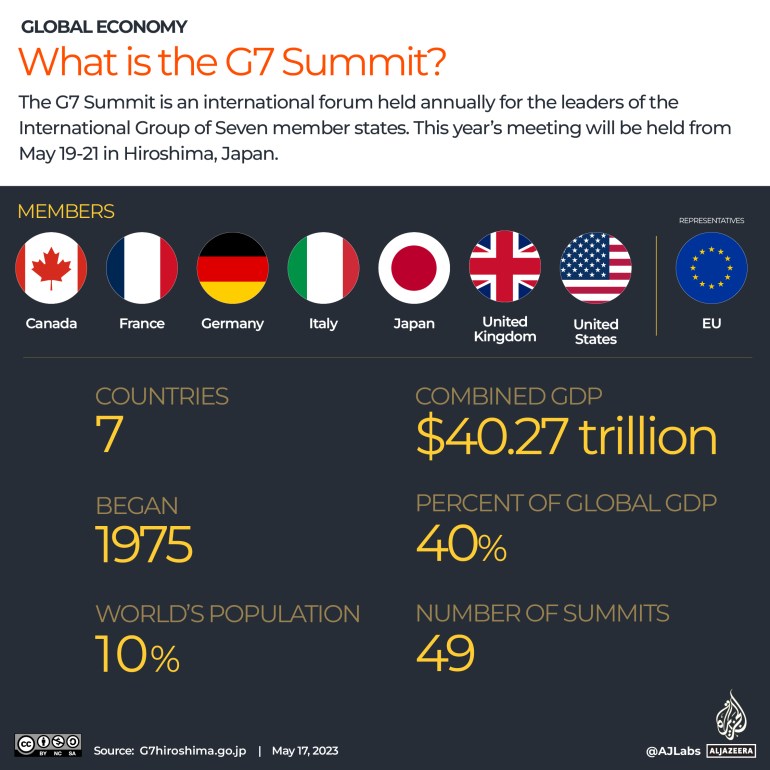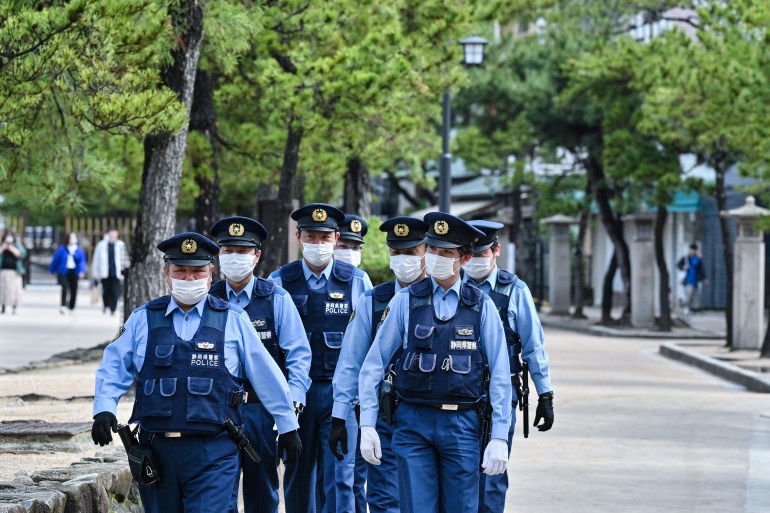G7 struggles with response to China ‘economic coercion’ threat
As leaders prepare for summit in Hiroshima, there appears little consensus on how to deal with the risk posed by China.

Tokyo, Japan – The G7 countries all agree on the threat of China’s economic coercion.
But reaching a consensus on concrete action to counter Beijing promises to be a challenge for the club of wealthy democracies amid divisions over how to manage ties with the world’s second-biggest economy.
Keep reading
list of 4 itemsG7 nations mulling near-total ban on exports to Russia: Kyodo
G7 finance heads vow financial stability, supply chain diversity
Japan to chair G7 talks on pressuring Russia over Ukraine
The leaders of the G7 — Canada, France, Germany, Italy, Japan, the United Kingdom and the United States — have signalled that China’s use of punitive trade measures will be high on the agenda of their three-day annual summit, which kicks off in Hiroshima, Japan, on Friday. European Union leaders will also be present.
China’s use of coercive economic moves has been an issue of growing concern in the Asia Pacific and Europe in recent years, with Japan, South Korea, Australia and Lithuania all facing trade restrictions following disputes with Beijing on issues ranging from the origins of the COVID-19 pandemic to Taiwan.
While the G7 is expected to release a statement that will express concern about China’s economic coercion and propose ways to work together on the issue, it is unclear how far Japan and European members may be willing to go with measures that could antagonise Beijing given their heavy reliance on Chinese trade.
Japan and the European Union both count China as their top trading partner. The United States, which has led global efforts to push back against Beijing, does the most trade with Canada and Mexico, with China ranking as its third-biggest partner.
Sayuri Shirai, a professor of economics at Keio University in Tokyo, said Japan and Europe may be more cautious than the US about actions that could disrupt trade relations with China.
“China’s GDP [gross domestic product] is going to exceed the US in the next decade and have a huge market … So having access to China’s market is important for advanced economies,” Shirai told Al Jazeera.
“Japan has a military alliance with the US so they may be closer to the US, but they may also have to be careful about their companies’ interest in China since many companies have done a lot of foreign direct investment in China,” Shirai added.

‘Economic NATO’
Some of the loudest calls for coordinated action against China have come from the US, where President Joe Biden has made countering Beijing a central pillar of his foreign policy.

Earlier this year, Bob Menendez, the Democratic chairperson of the Senate Foreign Relations Committee, called for the formation of an “economic NATO” to respond to economic coercion, military aggression and violations of sovereignty.
Former UK Prime Minister Liz Truss also floated the idea of an economic version of NATO in a speech in February in which she called on world leaders to be ready to impose coordinated sanctions on China if it makes aggressive moves towards self-governed Taiwan, which Beijing claims as its territory.
In March, the EU unveiled an “anti-coercion instrument” for member countries that includes a new dispute resolution mechanism and countermeasures such as customs duties and restrictions on public procurement.
China has rejected accusations that it uses trade as a weapon and accused the US of hypocrisy given its own use of sanctions and export controls.
“If the G7 summit will put ‘countering economic coercion’ on its agenda, I suggest that they should first discuss what the US has done,” Chinese Foreign Ministry spokesperson Wang Wenbin told a regular press conference last week.
“China itself is a victim of US economic coercion and we have always been firmly opposed to economic coercion by other countries.”
Enforcement is key
The divisions between the US and other G7 members on China are not the only differences to have emerged ahead of this weekend’s summit.
Last month, the Financial Times reported that Japan and the EU had objected to a US proposal for a G7-wide ban on practically all exports to Russia after deeming it to be unrealistic.
Still, US officials have sought to raise expectations that the G7’s stand on economic coercion will go well beyond rhetoric.
On Tuesday, US Ambassador to Japan Rahm Emanuel, who has criticised the World Trade Organization dispute resolution as slow and called for the US to lead collective action against Chinese coercion, told his social media followers to “expect action”.
“G7 members are developing the tools to deter and defend against China’s economic intimidation and retaliation,” Emanuel said on Twitter.
Mark Kennedy, director of the Wahba Institute for Strategic Competition at the Wilson Center in Washington, DC, said he expected the G7 to make progress towards coordinated action due to the growing realisation of the dangers of economic overreliance on any one country.
“Europe has witnessed the impact of coercion within its ranks more vividly than the US, most recently in Lithuania, and endured the pain from overreliance on a sole supplier as it weaned itself off reliance on Russian energy,” Kennedy told Al Jazeera.
“A focus on de-risking by diversifying supply chain … by building partnerships with low- and middle-income countries through investment and aid is very unifying. It also can be presented to the Global South as a location for alternative sourcing.”
Henry Gao, a Chinese trade expert at Singapore Management University, said, however, that the actual implementation of any coordinated measures is likely to be difficult.
“It’s easy to come up with statements, but enforcement will be a big problem, especially for Asian countries which have very close economic ties with China,” Gao told Al Jazeera.
“One model that might be useful in this regard is the EU’s anti-coercion instrument, which moves the decision-making from the country level to the EU level, but this would be very hard to replicate even at the G7 level, not to mention on a global basis.”